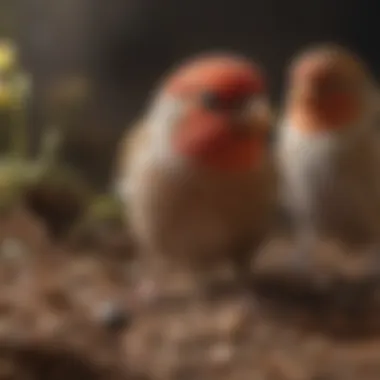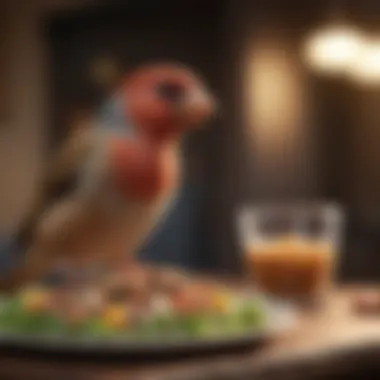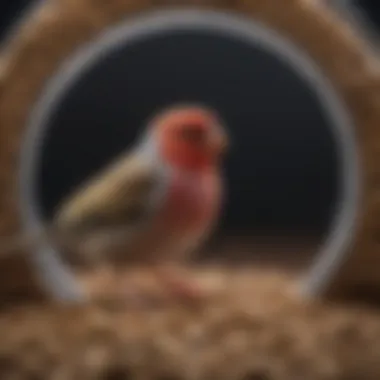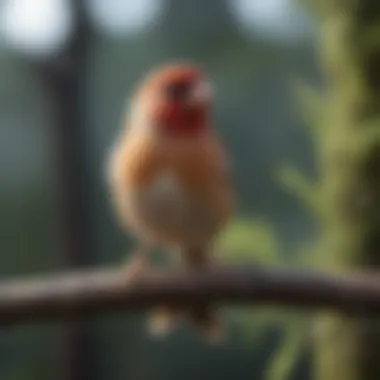Understanding Pet Finch Food: A Complete Guide for Owners


Intro
Understanding the dietary needs of pet finches is crucial for their well-being. These small birds have specific nutritional requirements that vary among species. Choosing the right food ensures a balanced diet, leading to better health and longevity. This guide aims to explore the critical components of finch food, including its composition, necessary nutrients, and practical feeding methods. By grasping these essentials, pet owners can make informed decisions to support the health of their finches.
Understanding Your Pet
Pet Behavior Basics
Finches exhibit a range of behaviors that are important for owners to recognize. Understanding vocalization, social interaction, and nesting habits can assist in providing a suitable environment. For instance, finches are social creatures and enjoy companionship. This means having at least two birds can reduce stress and promote natural behaviors.
Common Breed Characteristics
Several types of finches exist, each with unique traits. Zebra finches are known for their cheerful chirps. Gouldian finches are visually striking, distinguished by their vibrant colors. Each breed may have specific preferences for food types. Knowing these preferences helps navigate food choices effectively.
Species-Specific Needs
Different finches require varying nutrient compositions. For example, some finches thrive on a seed-based diet, while others benefit from fruits and vegetables. It is essential to identify the species of finch to cater to these needs correctly. Reading up on individual care guides can provide guidance tailored to specific species, ensuring pet owners understand their finch's requirements.
Pet Care and Maintenance
Feeding Guidelines
Establishing a feeding routine is critical. A balanced diet should include seeds, pellets, fruits, and vegetables. Seeds provide energy, while pellets often offer added vitamins and minerals. A general rule is to provide fresh food daily and replace any uneaten portions promptly to promote hygiene.
Grooming Essentials
Regular grooming is necessary for keeping finches healthy. This includes providing opportunities for bathing, as many finches enjoy water. Using a shallow dish or a specialized bird bath can allow for this behavior. Additionally, periodically checking for feather and skin integrity helps in preventing potential issues.
Hygiene Practices
Maintaining a clean environment is vital. Cages should be cleaned regularly to prevent the growth of bacteria. Droppings can accumulate quickly, so a daily clean-up is advisable. Disinfecting the cage weekly, while ensuring all perches and toys are safe, contributes to overall health.
Training and Development
Basic Commands and Skills
Training finches is often limited due to their small cognitive abilities, but basic interactions can enrich their lives. Simple commands, like coming to a perch, can be taught through consistency and positive reinforcement. Using treats like small bits of fruit or seeds can encourage these behaviors.
Behavioral Training Techniques
Utilizing positive reinforcement methods proves effective. For example, rewarding desired behaviors with treats helps reinforce these actions. Keeping sessions brief is key, as finches may lose interest quickly.
Addressing Common Behavior Issues
Understanding what triggers certain behaviors is important. Aggression or excessive chirping can stem from stress or territorial disputes. Identifying such behaviors early and adjusting the environment can help in reducing these issues.
Health and Wellness
Routine Vet Check-ups
Regular veterinary visits play a major role in preventive health care for finches. Identifying potential health issues early can significantly improve outcomes. Vet checks also provide opportunities for owners to ask questions about diet, behavior, and care.
Vaccination Needs
While finches typically do not require extensive vaccinations, they can be susceptible to specific diseases. Consulting with a veterinarian about any necessary vaccinations or medications is advisable, especially for new birds or those showing symptoms of illness.
Recognizing Signs of Illness


Awareness of any signs of illness is crucial for swift intervention. Symptoms may include changes in appetite, excessive sleeping, or unusual vocalizations. Monitoring these changes closely is essential, as early treatment can lead to better recovery outcomes.
Enrichment and Activities
Indoor vs. Outdoor Activities
Creating a stimulating environment is essential for finches. Indoor activities include providing variety in toys and perches. Outdoor time, in a safe environment, can also benefit birds greatly. Be sure to supervise outdoor activities for safety.
Interactive Toys and Games
Offering interactive toys can reduce boredom. Toys that encourage foraging behaviors or mirror play can provide necessary mental stimuli. Rotating these toys periodically can help maintain their novelty.
Socialization Opportunities
Allowing finches to interact with each other supports social behavior. This also helps to lessen stress. Care must be taken to ensure compatibility, as some species or individuals may not get along.
Providing the right food, environment, and care ensures that pet finches lead happy, healthy lives.
Intro to Finch Nutrition
Understanding nutrition for pet finches is essential for ensuring their health and well-being. Like any pet, finches require a balanced and varied diet to thrive. Poor nutrition can lead to a range of health issues, from feather plucking to organ dysfunction. Therefore, owners must prioritize their finch’s dietary needs from the outset.
A well-structured approach to feeding pet finches involves not only knowing what to provide but also understanding the specific requirements of different species. Each kind of finch has unique nutritional needs based on its natural diet and habitat. Owners must respect these differences and choose foods that cater to them. Additionally, the right nutrition can enhance the finch's vitality, promote singing, and encourage social interactions.
"Proper nutrition is not just about filling a bowl with seeds. It’s about nourishing a life and enhancing the joy they bring into yours."
In this guide, we will explore finch species, their dietary needs, and the various food options available. This knowledge will equip finch owners to make informed choices and support the optimal health of their feathered companions.
Understanding Finch Species
Finches come in numerous species, each exhibiting unique behavioral and dietary characteristics. Popular pet species include the Zebra Finch, Society Finch, and Gouldian Finch. These varieties differ slightly in their natural environments and dietary preferences, which influences their nutritional needs.
- Zebra Finches are often seed-eaters in the wild but also enjoy fruits and vegetables. They are known for their adaptability and can thrive on a diverse diet.
- Society Finches typically have less stringent dietary limits but should still receive a variety of seeds and fresh produce to ensure balanced nutrition.
- Gouldian Finches require a richer diet filled with seeds high in fat and protein, alongside a mix of other foods to meet their specific needs.
Understanding the species of finch can guide the selection of appropriate foods, ensuring they receive the right balance of nutrients.
Why Nutrition Matters
Nutrition is a cornerstone of a finch's overall health. A well-rounded diet not only supports physiological functions but also boosts mental well-being. Finches are naturally active birds, and a proper diet fuels their energy levels, conforming to their energetic lifestyle.
Ommission of essential nutrients can result in deficiencies that lead to serious health problems. For instance, a diet lacking in calcium can lead to weakened bones and reduced egg production in breeding females. Similarly, insufficient vitamins may impair their immune system, making them susceptible to diseases.
Additionally, the psychological aspect cannot be overlooked. A varied diet promotes foraging behavior, which is vital for mental stimulation. Pet owners can foster a natural environment by incorporating different foods into their finch's diet, thereby reducing stress and boredom.
Essential Components of Finch Food
Understanding the essential components of finch food is crucial for maintaining the health and well-being of your pet finch. Nutrition plays a significant role in the overall vitality of finches. A balanced diet, that includes seeds, fresh produce, pellets, and supplements, ensures that they receive the correct nutrients. Each component contributes uniquely to their dietary needs across different finch species. Thus, knowledge about these components helps make informed decisions about food selection, promoting healthier and longer lives for these birds.
Seeds: The Staple Diet
Seeds often serve as the foundational component of most finch diets. They are rich in various nutrients and are easily obtainable. Knowing which seeds to provide is vital as they contribute to a balanced intake of essential fats, proteins, and carbohydrates.
Common Seed Varieties
Common seed varieties include millet, canary seed, and thistle seed. These seeds are often favored in finch diets due to their digestibility and high energy content. Millet, for instance, provides energy-rich carbohydrates which are crucial for an active bird. It is beneficial because it supports healthy feather development and maintains good energy levels during the day. However, while seeds are important, it is crucial to avoid overreliance on them as their nutritional profile varies.
Seed Mix Quality
The quality of seed mixes should not be overlooked. A well-balanced seed mix ensures that finches receive a range of nutrients. When selecting seed mixes, check for freshness and avoid those with added artificial colors or preservatives. Quality mixes often contain a variety of seeds that promote diverse nutrient intake. When comparing different mixes, choose those that have whole seeds rather than fragments, as whole seeds retain their nutritional integrity better.


Fresh Fruits and Vegetables
Fresh fruits and vegetables can complement a seed-based diet, providing additional vitamins and minerals. They play a significant role in enhancing the health of finches, offering hydration and critical nutrients that seeds alone may lack.
Safe Foods for Finches
Not all fruits and vegetables are suitable for finches. Safe options include apples, broccoli, carrots, and peas. These foods supply essential vitamins and minerals, contributing to the overall metabolic health of your finch. It's important to ensure that these foods are free of pesticides and thoroughly washed before offering them. While introducing fresh produce into the diet, monitor the bird's reaction and avoid foods that may cause digestive issues.
Preparing Fresh Produce
Preparing fresh produce correctly is as important as selecting the right types. Chop fruits and vegetables into small, manageable pieces for easier consumption and digestibility. Avoid adding seasonings or oils that are harmful to birds. Fresh produce should be offered daily but removed after a few hours to prevent spoilage. This practice helps in maintaining clean feeding areas.
Pellets: A Nutritional Alternative
Pellets are increasingly being recognized as a valuable addition to a finch's diet. They are specifically formulated to meet the nutritional requirements of finches, which is an advantage over a seed-only diet.
Advantages of Pellets
The primary advantage of pellets is their balanced nutrition profile. They are designed to provide a complete diet, potentially reducing the likelihood of nutritional deficiencies. Pellets often contain a mix of proteins, vitamins, and minerals, which are essential for overall health. Their consistency helps to prevent selective feeding, where a bird might only pick seeds they prefer, thus ensuring a more balanced intake of nutrients.
Integrating Pellets into Diet
Integrating pellets into the diet may take time as finches can be picky eaters. Start by mixing a small portion of pellets with their regular seeds. Gradually increase the pellet ratio over days. It's essential to observe the bird's acceptance of the pellets to ensure they adapt to the new diet. While pellets can serve as a staple, they should complement, not replace, seeds and fresh produce entirely.
Supplements for Optimal Health
Consideration of supplements can enhance dietary intake, especially for finches that may need additional nutrients. Supplements support various health aspects, focusing on calcium, vitamins, and amino acids vital for their development.
Calcium and Vitamin Needs
Calcium is critical for maintaining strong bones and health in birds. Good sources include cuttlebone or calcium blocks, which help fulfill this need. Additionally, specific vitamins, particularly A and D, are necessary to ensure proper metabolic function. Paying attention to calcium and vitamin intake is essential as deficiencies may lead to serious health issues in finches over time.
Amino Acids Importance
Amino acids play a fundamental role in the overall health of finches. These are necessary for muscle development and tissue repair. A balanced diet ideally creates the required amino acids, but in certain cases, specific supplements find their place to bridge nutritional gaps. Consideration of protein-rich foods can help in fulfilling these requirements. Regular evaluations of the diet can ensure that finches receive sufficient amino acids, contributing positively to their health.
Identifying Quality Finch Food Products
Understanding how to identify quality finch food products is crucial for pet owners who wish to provide their birds with adequate nutrition. The health of finches significantly depends on the quality of their food. Poor quality feeds can lead to various health problems, impacting their lifespan and overall well-being. By recognizing what to look for in finch food, owners can ensure their pets lead a healthy and happy life.
Reading Food Labels
Food labels provide essential information about the composition of finch food. They are the primary resource for understanding what you are feeding your finches. When reading these labels, pay attention to ingredients listed at the forefront. The first few ingredients contribute the most to the food's overall content. Look for high-quality seeds, as they should be prominent. Ingredients can be categorized as either primary, which forms the main part of the diet, or secondary, which includes supplements and flavor enhancers.
Additionally, examining the nutritional breakdown is equally vital. A quality finch food label will provide clear percentages of protein, fats, and fibers. Finches generally thrive on a diet that is higher in carbohydrates and proteins while maintaining adequate fat levels. Understanding the daily nutritional needs based on your finch's specific species can guide you in selecting the right food.
Recognizing High-Quality Ingredients
High-quality ingredients make the difference in finch food. Look specifically for organic seeds without additives or preservatives. Natural ingredients often indicate that the food is both nutritious and safe. Common examples include millet, canary seed, and sunflower seeds.
It is important to avoid feeds containing fillers, which often dilute nutritional value. Ingredients such as corn and fillers like wheat can be lower in beneficial nutrients. Instead, seek out products that highlight the use of whole, minimally processed grains and seeds. Additionally, fresh fruits and nuts can enhance the quality of finch food.
Avoiding Harmful Additives
Harmful additives can jeopardize the health of finches. Many commercial finch foods may contain artificial colors, flavors, or preservatives that can be detrimental to their health. It is critical to avoid feeds that list these harmful substances in their ingredient list. Instead, seek foods that stress natural preservation methods.
Some common harmful additives to watch for include:
- Artificial colors: These provide no nutritional value and can affect the health of your finch.
- Preservatives: Chemicals like butylated hydroxyanisole (BHA) can be toxic with prolonged exposure.


Finch owners should be diligent and informed when choosing food. By selecting quality products and avoiding harmful additives, they can contribute to the long-term health of their birds.
Feeding Practices for Finches
Feeding practices are fundamental for maintaining the health and vitality of finches. A well-structured feeding approach ensures that finches receive the correct nutrients to thrive. Various aspects of feeding — such as establishing a routine, being mindful of portion size, and monitoring food intake — all collectively help pet owners achieve optimal nutrition for these birds. Careful attention to these practices can lead to healthier pets and a more enjoyable experience for both the owner and the finch.
Establishing a Feeding Routine
Setting up a consistent feeding routine is essential for finches, as it aids in their overall well-being. Regular feeding times help finches develop a sense of security and predictability in their day-to-day life.
Frequency of Feeding
Frequency of feeding plays a key role in the dietary habits of finches. Ideally, providing food at least twice a day is recommended. This frequency will accommodate their natural feeding behavior. The advantage of having a routine feeding schedule means that owners can monitor how much food the birds consume. Moreover, it prevents the scattering of food throughout the cage, minimizing waste. However, if the same food is left untouched, it could indicate an issue needing attention.
Portion Control
Portion control has special significance in finch feeding practices. By offering food in measured servings, owners can ensure that finches eat an appropriate amount without overindulgence. It allows pet owners to avoid issues like obesity which can arise from free-feeding methods. Additionally, consistent portion sizes help maintain a balance in the different types of food offered. However, it is important to remember that some finches might need more or less food depending on their age, activity level, and species.
Monitoring Finch Food Intake
Another essential practice is monitoring how much food finches actually consume. Observing food intake gives valuable insights into their health and preferences. This monitoring can reveal dietary needs and potential concerns well before they develop into serious issues.
Observing Eating Habits
Observing eating habits is vital as it allows owners to understand what their finches prefer and how much they are able to eat. Noticing changes in their eating patterns can be an early warning sign of health issues. For example, a sudden decrease in food consumption could indicate illness or stress. By being vigilant about these habits, owners can react promptly to negative changes.
Adjusting Diet as Needed
Finally, adjusting the diet as needed is a practice that should not be overlooked. Finches may require dietary changes based on various factors, such as changes in season or health conditions. Adapting their diet ensures that they receive the necessary nutrients. This flexibility is a beneficial aspect of finch care, as it allows owners to respond to the individual needs of their birds. However, owners must be cautious and switch foods gradually to prevent gastrointestinal upset.
A well-planned feeding practice contributes positively to a finch’s health, happiness, and longevity.
Common Feeding Mistakes to Avoid
Understanding how to properly feed finches is essential for their health and wellbeing. Many pet owners unknowingly make common mistakes that can negatively affect their birds' nutrition. Identifying and correcting these mistakes is a crucial step in ensuring finches live long, healthy lives. This section will focus on some of the most pervasive feeding errors and their implications.
Overfeeding vs. Underfeeding
Finding the right balance between overfeeding and underfeeding is vital for maintaining the health of your finch. Overfeeding can lead to obesity, which is a serious health concern in pets. When finches consume too many calories without enough exercise, they may develop fat deposits that burden their organs, leading to complications like fatty liver disease or heart issues.
On the other hand, underfeeding can be just as detrimental. Insufficient food intake can result in malnutrition, stunted growth in younger finches, and weakened immune systems. Adult finches may starve, leading to severe health issues and, ultimately, death.
A good practice is to measure the amount of food you provide daily. Adjust the portions based on your finch's activity level and age. Seed mix, pellets, and fresh produce should be weighed to avoid excessive portions and ensure your finch gets what it needs. Regular monitoring of weight will help in maintaining optimal health.
Neglecting Hydration Needs
Hydration is frequently overlooked but is critical for finch health. Finches require clean, fresh water daily, and neglecting this can lead to dehydration quickly. Dehydration can cause serious health problems, affecting numerous body functions and resulting in fatigue and lethargy.
Most small birds are not good at recognizing when they are thirsty. Thus, it is crucial to check and refill the water daily. A standard water bottle or bowl can work, but it must be cleaned regularly to prevent bacteria growth.
Moreover, using a water bowl allows birds to bathe, which helps their feathers stay clean and healthy. Keeping an eye on water consumption can also be an indicator of your finch's health. Changes in drinking habits may signal illness, and owners should take action if they notice shifts in patterns.
Remember: Paying attention to food and water intake is essential for maintaining a healthy and happy finch.
Ending
In summary, understanding the nutritional needs of pet finches is crucial for their overall health and vitality. This article has explored various aspects of finch nutrition, emphasizing the significance of a well-structured diet. Finches require a balance of seeds, fresh produce, and supplements to thrive. The quality of the food they consume directly impacts their health and longevity. By ensuring they receive the nutrients they need, pet owners can help avoid common health issues.
Recap of Important Points
- Balanced Diet: Finches thrive on a varied diet consisting of seeds, fruits, vegetables, and pellets.
- Quality Ingredients: Selecting high-quality, natural ingredients is essential. Look for food with limited preservatives and additives.
- Feeding Habits: Establish consistent feeding routines while monitoring food intake to maintain a healthy weight and prevent overfeeding.
- Hydration: Fresh water must always be available. Proper hydration is just as important as nutrition.
Final Thoughts on Finch Nutrition
Ultimately, providing a comprehensive understanding of finch nutrition helps foster a nurturing environment for these birds. Proper diet leads to happier, more active birds. Moreover, as pet owners, taking the time to learn about dietary needs reflects a commitment to the well-being of your pets. By integrating knowledge of finch food into daily practices, pet owners not only contribute to healthier lives for their finches but also enhance the joy of having these beautiful creatures in their homes. For continuous improvement in their health, regular consultation with avian veterinarians and updated research is recommended. Keeping the importance of nutrition at the forefront can ensure that finches lead optimal, fulfilling lives.







